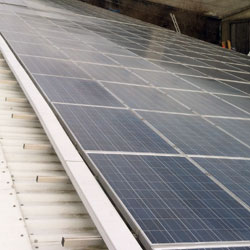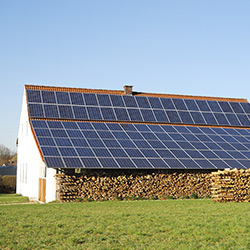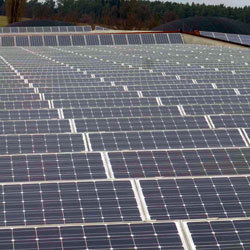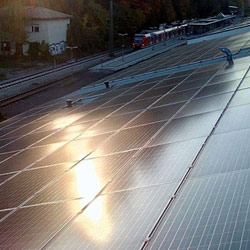Why should PV systems be cleaned?
- Dirt on solar modules, such as dust, pollen, soot, leaves, moss, bird droppings, etc., considerably reduces the efficiency of your PV system
- Contamination can hardly be recognized with an unaided eye, since it first appears on the edges and frames
- Contamination fosters harmful plant growth (appearance of lichens), which can damage your modules
- Rain can wash off dirt only conditionally, stubborn dirt requires professional cleaning
What are the advantages of PV system cleaning?
- Prevention of 5-30% reduction in module performance
- Constant maximal yield of every single module
- Longer life expectancy and, therefore, longer remaining service life of your PV system
- Safety of your investment!
Contamination calculator
“Do you know how much money you lose every year by not cleaning your PV system regularly?”
You can lose up to the following amount per year due to light soiling of your PV system:
Your exclusive advantages as a Milk the Sun client
- Price advantages due to a high number of users and therefore the best purchasing conditions
- Professional partners with many years of experience and the best references
- Use of certified gentle cleaning devices for module cleaning
- Fully ecological cleaning with demineralized water
- Visual inspection of your PV system during every cleaning to identify defects
- Possibility of lucrative long-term contracts with fixed cleaning dates
We have convinced you:
- Request your tailor-made offer right here and quickly secure your desirable date of appointment:
What clients say about us
FAQ
First and foremost, professional photovoltaic cleaning increases the yield of photovoltaic systems. This increases the income that can be generated due to private use of electricity or feeding electricity into the grid. Photovoltaic cleaning also prolongs the life cycle of PV systems as the solar modules are regularly checked by trained specialists, who can quickly identify and prevent damages or damage sources.
Neglecting system cleaning not only reduces the yield of the plant, but also, depending on the contamination level of solar modules, shifts the amortization time of the of the PV system further into the future.
Neglecting system cleaning not only reduces the yield of the plant, but also, depending on the contamination level of solar modules, shifts the amortization time of the of the PV system further into the future.
As a rule, it is necessary to clean photovoltaic systems once a year. This should be preferably done in spring, in order to free the solar modules from dirt accumulated during autumn and winter and to prepare for the sunny summer and autumn months.
In some cases, however, due to the location and the orientation of the PV system, or in order to comply with special requirements of the manufacturer warranty, it is advisable to leave shorter intervals between the cleanings. PV systems located in the following areas may need system cleanings more often:
PV systems near industrial areas
PV systems near farming areas or on barns
PV systems near seaports
PV systems near forests
At these locations photovoltaic systems are exposed to an increased load of soot, dust, sand, agricultural mist and pollen. Depending on the level of contamination, this will require several system cleanings per year.
In some cases, however, due to the location and the orientation of the PV system, or in order to comply with special requirements of the manufacturer warranty, it is advisable to leave shorter intervals between the cleanings. PV systems located in the following areas may need system cleanings more often:
PV systems near industrial areas
PV systems near farming areas or on barns
PV systems near seaports
PV systems near forests
At these locations photovoltaic systems are exposed to an increased load of soot, dust, sand, agricultural mist and pollen. Depending on the level of contamination, this will require several system cleanings per year.
Professionally trained and experienced cleaning personnel know exactly how to clean your photovoltaic system. During unprofessional cleaning with wrong tools and chemical cleansers, the dirt is mostly just smudged. Furthermore, wrong cleaning can cause glass corrosion and scratches on modules.
Besides, as photovoltaic systems produce electrical current, they may pose a threat to life and health if treated unprofessionally. Particularly when cleaning the modules with water, one should rely on experienced cleaning staff.
To prevent unwanted repairs and loss of profits, you should have the cleaning done by professionals. Thus, you will not lose module warranty because of improper handling, your system will continue to produce electricity effectively and you always stay on the safe side.
Besides, as photovoltaic systems produce electrical current, they may pose a threat to life and health if treated unprofessionally. Particularly when cleaning the modules with water, one should rely on experienced cleaning staff.
To prevent unwanted repairs and loss of profits, you should have the cleaning done by professionals. Thus, you will not lose module warranty because of improper handling, your system will continue to produce electricity effectively and you always stay on the safe side.
Professional devices for PV cleaning have special soft bristles that cannot damage PV systems. If necessary, rotary brushes can also be used. To treat your photovoltaic system as careful as possible, the water used is of very low temperatures - from 10 ° C to maximum 50 ° C - depending on the level of contamination. In order to achieve the best possible result and, at the same time, to stay eco-friendly, only demineralized water should be used during cleaning.
Photovoltaic modules are meant for a long lifetime but are very sensitive. The surface finish of your photovoltaic modules can be greatly altered by chemical cleansers and unprofessional cleaning, which can lead to glass corrosion and even further accumulation of dirt and lichens. Reduced light incidence and power losses are logical consequences. Furthermore, there arises risk that the silicone seals between glass and frames may become porous.
At first, unprofessional cleaning will not cause any visible damage. However, over a lifetime of 20 to 30 years, reduced insolation caused by glass corrosion and damages caused by porous seals between glass and frames become recognizable. In the worst case, replacing the modules becomes inevitable. If the PV systems were cleaned improperly, the module manufacturers will seldom recognize those defects as a warranty case, and you will be left with the costs.
This depends on various factors. Depending on the accessibility, size, type of the system and degree of contamination, cleaning may take more or less time. As soon as we get the pictures from the plant and surroundings, as well as the information from the questionnaire, we can give you more information.
After the cleaning plant owners / operators and cleaners inspect the photovoltaic system and sign an acceptance certificate.
Professional cleaners are insured against such cases. If, despite all precautions, your system is damaged during the cleaning, insurance covers the costs of the damage caused and the loss of income.
The cost of professional photovoltaic cleaning is determined by a number of attributes. Factors such as accessibility, surface area of the modules and contamination level are decisive factors here.
Contact us right now and get your personal tailor-made offer.









